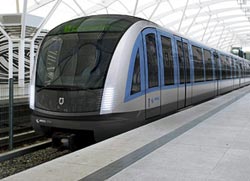Munich's new metro design wins two awards

<br>
The design is the work of internationally-renowned Munich vehicle designer Alexander Neumeister, the founder of N+P Industrial Design.
As with the previous version it was developed in close conjunction with Munich Public Transportation Company (MVG), a subsidiary of Munich City Utilities (SWM). The trains will be built by Siemens Rail Systems in Vienna and Munich.
More space plus innovative lighting: the C2 trains have an elegant look to them. Copyright: SWM/MVG/N+P Industrial Design
The reasons given for the award include: “Externally, the C2 metro represents the future of rail, with its lighting and semi-transparent, extensive surfaces. The excellent lighting leads the way in public transportation; it represents safety and a certain speed. The train has a very open, transparent design – this also makes it look hygienic and it is easier to clean.”
The new metro trains are heavily based on the familiar design of the previous generation of vehicles (C-train). Further development of the proven vehicle design has made the new trains even more customer-friendly, economical and ecological than the C1 type. A great deal has been adopted from the latest development in metro vehicles, which is marketed by Siemens under the name Inspiro. Delivery of the new metro trains is scheduled for the end of December 2013.
The Universal Design Award is an international competition, with prizes awarded annually since 2008. All contributions submitted are critically examined and assessed by experts as well as a panel of consumers. This year, the awards received 121 submissions from ten different countries.
Editor
Ellen Schramke / Yashar Nasrollahi-Azad
+49 30 386 22370
ellen.schramke@siemens.com
yashar.nasrollahi-azad@siemens.com
Media Contact
All latest news from the category: Awards Funding
Newest articles

First-of-its-kind study uses remote sensing to monitor plastic debris in rivers and lakes
Remote sensing creates a cost-effective solution to monitoring plastic pollution. A first-of-its-kind study from researchers at the University of Minnesota Twin Cities shows how remote sensing can help monitor and…

Laser-based artificial neuron mimics nerve cell functions at lightning speed
With a processing speed a billion times faster than nature, chip-based laser neuron could help advance AI tasks such as pattern recognition and sequence prediction. Researchers have developed a laser-based…

Optimising the processing of plastic waste
Just one look in the yellow bin reveals a colourful jumble of different types of plastic. However, the purer and more uniform plastic waste is, the easier it is to…



